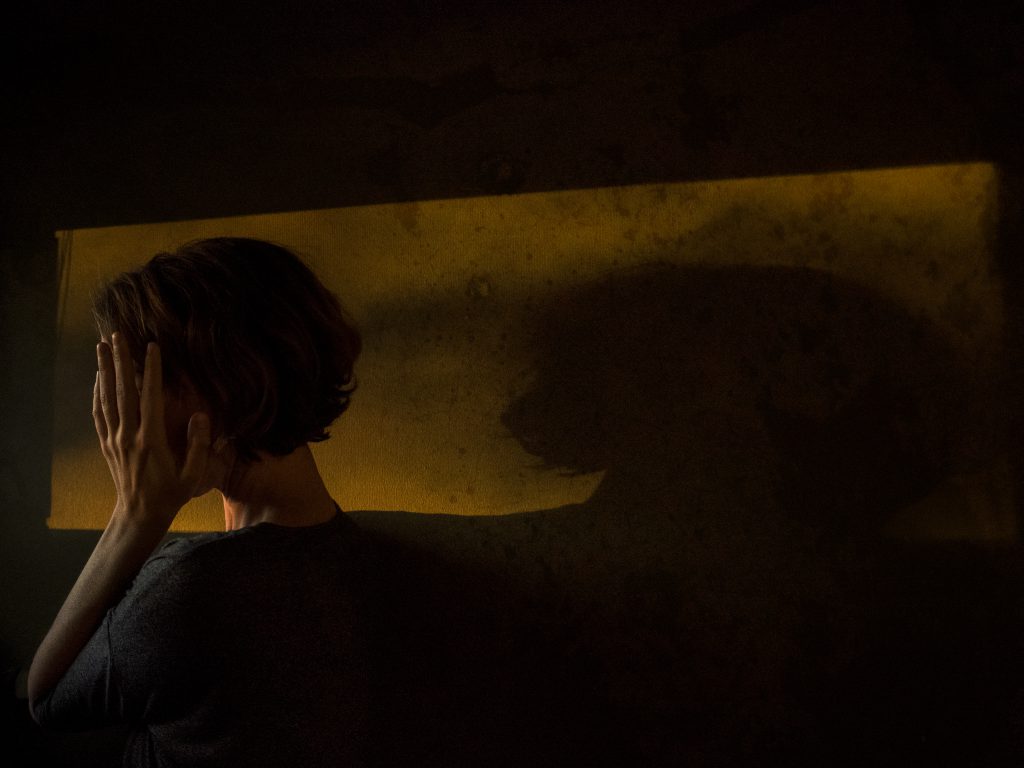
I still remember the first odd sound of anxiety that whispered in my ear and sat in my gut. It was 1989, and I was a shy skinny girl living in a small town in Georgia. I was supposed to go to my friend’s house that night, and I had packed a puff-paint t-shirt and was already wearing my pink jellies. I was the epitome of 80’s style with my short curly hair and large, peach glasses! When she and her mom arrived to pick me up, the fear that I would learn to know so well took hold of my mind, and I knew I couldn’t leave. I don’t remember if I cried and begged not to go or if my parents just thought I wasn’t feeling well. Either way, I sat on my bed that night feeling guilty about letting Kathy down, sad to miss a sleepover but relieved that my stomach wasn’t tight anymore. I was safe in my home with my parents I had nothing to worry about. I would be ok; next time would be better.
The truth is, I wasn’t better the next time. Or the time after that. And soon I could hardly be in a different room from parents without melting into a full-blown panic attack. My parents had to pick me up from school I don’t know how many times, and I began to see a psychologist, which brought on another round of panic since my parents couldn’t go in the room with me. Eventually, I was sent to a mental hospital in Atlanta where I stayed for two months, only being sent home because insurance ran out. There were no “Go Fund Me’s” in those days, and no online support groups for my parents to help them wade through this mess. It took years of struggle, therapy sessions, and a lot of fear to get to where I could live a more normal life after that.
Things have changed so drastically for me since I was that scared, unhealthy little girl. I got a degree, started a business, got married and became a mom. And I’m not embarrassed to talk about my childhood mental illness the way I was for over 20 years. In college, I finally dared to open up to others about it, and what I found was a tremendous amount of support, and surprisingly others who had been through similar things. My voice still shook as I shared, but slowly I got used to telling people I was once in a mental hospital.
This past year I have taken my boldest step in openly sharing by starting this blog. Even though my anxiety is not nearly as extreme as it was as a child, I still struggle with it and am now on medication that helps keep it at bay. I see a therapist when life gets too overwhelming for me to handle, I participate in small groups, and do my best to live as healthy as possible. There are good days and bad, as well as good and bad seasons, but on the whole, I feel empowered to work on my mental health continually. I also feel more empowered than ever to share my story in hopes to spread knowledge about mental illness and help break the stigma that surrounds it. The following are five facts that I believe are imperative for people to know about mental illness so that they have the knowledge and power to help themselves or others who are struggling.
1. You Probably Know Someone With a Mental Illness
You probably know several people, possibly even family members. If you can’t think of anyone, remember that you may not know that they have a mental illness because they are too embarrassed to share their struggles. Did you know that 1 in 5 Americans will suffer from a mental disorder in their lifetime? Out of those 1 in 5, only 44% of those who are suffering actually receive treatment. There are many reasons for this, and some of the most common are from stigma, discrimination, and lack of resources. Many people do not receive care because they are embarrassed or ashamed. They also may not know where to turn for help or have access to the care that is needed. This is why it is so crucial for the stigma around mental illness to end. We need to work for better care and access for those who need it.
2. People Who Have A Mental Disorder Can’t Just Snap Out Of It
I remember people telling me many times that I should just get over my anxieties. Sometimes it was out of frustration from those who loved me and wanted to help but didn’t know how. Sometimes it was from people I hardly knew saying things like “What’s so bad about (insert irrational fear)? I just think about (insert something happy)?” as if I hadn’t tried doing that a million times before. I’ve had people say that with more prayer, and more trusting in God, that things would get better. Can you imagine the shame that was felt when those things didn’t work? Would you tell a nine-year-old child, sick in a hospital, that if they simply trusted God more, they would get better? I’ve even had people tell me that they didn’t believe certain mental disorders were real, that they were just made up to try to get more kids on medication. The fact is, most people who have a mental illness have tried everything they can think of on their own to get better. And they really, really, really wish they could just snap out of it. Mental illness is complex and caused by many factors including biology, genetics, and trauma and can not be treated with three clicks of your heals and a wish to go home.
Additional Information on Causes of Mental Illness.
3. Having a Mental Illness Does Not Mean You Are Weak
A huge misconception about mental illness is that it means you are weak. I have often found that those I know with a mental illness are some of the strongest people I know! Because of the stigma around mental illness, it can take a lot of courage and vulnerability to ask for help. It can take a lot of strength to even get out of bed sometimes. What can be easy for most people can require much more hope, faith, and power for those facing a mental disorder. We often hear about how strong and courageous people are when they are battling a physical illness. Those with physical ailments go to doctors, ask for help, and share with others what is going on with them without worry of being shamed for their sickness. However, in our culture, this same reaction is not typical for those battling mental illness. So many cultural factors can play into why mental illness is often seen as a sign of weakness, or worse, not real. However, the bottom line is that this view has to change, and it can start with you. Be aware of how you discuss mental illness in your home, with your friends, and in your community. Be open about struggles you have and affirm and believe those who are struggling. Seek help when you need it. Not receiving proper treatment because of stigma, fear, and lies can have dire consequences, including death.
Read more about ways to help end the stigma with how you speak about mental illness.

4. 50% of All Lifetime Cases of Mental Illness Begin Before the Age of Fourteen
Not only that, there is on average an 8-10 year delay between the onset of symptoms and diagnosis! I am forever grateful that I was able to get treatment early and that my parents did their best in advocating for me. Our children need us to work on creating an environment where they can receive proper treatment long before this kind of delay occurs. Did you know that suicide is the third leading cause of death in youth ages 10-24? Did you know that 50% of students age 14 and older drop out of high school? Did you know that we can help make a healthier generation of kids through education, awareness, and resources for kids who have a mental illness? Let’s continue to spread awareness so that our kids have the best chance for a healthy life as possible.
You can find more information on helping your child with a mental health condition here.
5. Recovery is Possible, Never Give Up Hope
Amidst the troubling statistics surrounding mental health, I am happy to say there is good news. Recovery is possible, and we should never give up hope. What does recovery look like? It means that you can live a full life, make healthy choices, engage meaningfully with the world, and build relationships within a community. It can be a steep and winding road that includes many different aspects of care such as therapy, medication, and support groups. I think back to when my mind would not let me leave my parent’s side without dread and panic washing over me, and I see how far I’ve come. No offense mom, but I’m glad I was able to fly the nest! I wouldn’t mind a few fewer states between us though. I still think about what the man I grew up with told me, that I was the last person he had expected to do anything with their life, but his words have given me a different perspective over the years. We should never expect so little from those we know and love. Even when someone is at their worst and in the depths of despair, we should always have faith for a brighter future. Those fighting a mental disorder need people in their lives who believe in them and can carry some hope even if they can’t at the time.
If you or someone you love has a mental illness, or you suspect is suffering from one, NAMI is an incredible resource. They are a nonprofit and a leading voice on mental health. You will find referrals, support groups, and additional information on walking along with or through a mental illness.
Web: www.NAMI.org
NAMI Help Line: 800-950-6264
In a Crisis? Text NAMI to 741741

Whitney Leigh Carlson

3 Comments
Thank you for sharing this, Whitney. We are taking my youngest to a counselor this week because of this very issue. He has developed separation anxiety. I can only imagine it’s the result of a lot of changes and transition that are happening for him right now. It breaks my heart to see him suffer, knowing how crippling anxiety can be, at such a young age (he’ll be 10 in a few weeks), but I’m so glad that we can bring him to help! Keep talking about this! Parents need to know that their children aren’t just being “difficult” or “acting like babies”, they are honestly suffering!
Oh, Jenny, that is so hard. My heart goes out to him. My official diagnosis was separation anxiety, around that same age, and it began after I went through a lot of transition. I have read that there is something around that age developmentally that can bring about anxiety for those that are prone to it. You are doing the right thing by bringing him to counseling and seeing what is going on for him. I’m sure it’s been difficult for you too. Only after having Monroe did I really start to understand what my parents went through. Thanks for sharing with me, and if you have any questions, I am always here to help.